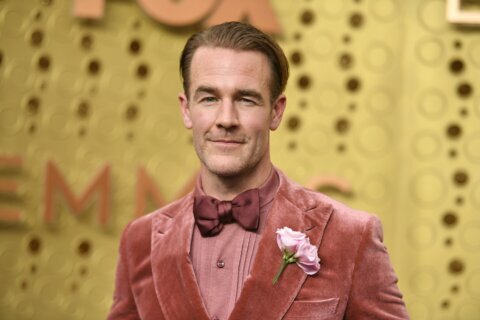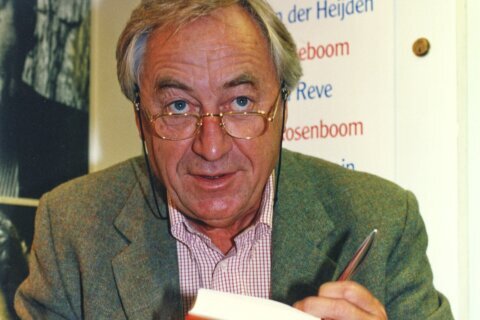WASHINGTON — “Someday a real rain will come and wash all this scum off the streets.”
Paul Schrader’s “Taxi Driver” prose was suddenly born again as a hard rain fell outside of our conversation at the Four Seasons in Georgetown. It was a cleansing, baptismal rain, perfect for the spiritual and environmental themes that collide in his new film “First Reformed.”
“It’s the notion of Christian stewardship,” Schrader told WTOP. “One character says, ‘Maybe this is God’s plan.’ He says, ‘What do you mean? It’s God’s plan to destroy his creation?’ And the other says, ‘Well, He did once, for 40 days and 40 nights.’ It’s kind of jaw dropping.”
Thus, the film challenges present-day evangelicals to become environmentalists, two sides of the political spectrum that often clash. Caught in between is Toller (Ethan Hawke), a former military chaplain grieving the death of his son while serving as the priest at a small-town church called First Reformed. Here, he counsels a woman named Mary (Amanda Seyfried), whose husband is a radical, suicidal environmentalist fueled by fears of climate change.
“Humankind has been having a dialogue for 10,000 years: Why are we here? Where are we going?” he said. “It was always a hypothetical conversation. … Now, for the first time in the history of the race, it’s starting to look like it’s not a hypothetical question. That’s an intense amount of gravitas to weigh on everyone. It starts to define your other types of despair.”
For the role of the conflicted clergyman, Schrader said Ethan Hawke was an easy choice.
“There’s a certain physiognomy in playing a man of the cloth, be it Montgomery Clift in ‘I Confess,’ Belmondo in ‘Leon Morin’ or Claude Laydu in ‘Diary of a Country Priest.’ So, you’re thinking about actors who have that physiognomy, maybe Jake Gyllenhaal, Oscar Isaac, but Ethan was 10 years older than them and his face was getting some very interesting wrinkles. I started thinking he’s just right for this. I sent him the script and he responded right away.”
Hawke’s performance goes from contemplative to harrowing as he considers ecoterrorism.
“He’s going to blow up a church, but this pregnant woman arrives and he can’t do it, so he reverts to turning himself into the sacrifice. This is a pathological fallacy deeply embedded in Christianity, the notion of suicidal glory, that my own suffering can redeem me. It’s not what the Bible teaches, (nor) what Jesus taught. It is a fallacy that is virtually the same as Jihadism.”
Hawke’s self-purgation finds him drinking Drano and wrapping himself in barbed wire.
“It’s a reference to Flannery O’Connor’s ‘Wise Blood’ (by) John Huston, where Hazel Motes at the end of that book puts his eyes out, wraps him up with wire and goes out preaching.”
This sacrifice is ultimately alleviated when Seyfried enters the room and the two embrace amid a swirling camera. It’s the first time the camera moves. Schrader uses a static camera with a 4:3 aspect ratio for the entire movie, before unleashing a circling camera like Alfred Hitchcock’s “Vertigo” (1958) or Brian De Palma’s “Obsession” (1976), which Schrader wrote.
“When you start working on the spiritual side of the street, the still side of the street, you have to stretch time,” Schrader said. “This is a very static film. The camera does not move, pan or tilt. It just sits there. It is very passive aggressive and takes too long to do everything. All of a sudden at the end, it jumps like a bird from a cage into a kinetic, whirly-gate soul in flight.”
As the camera circles, the soundtrack delivers the spiritual hymn “Leaning on the Everlasting Arms.” Film buffs will recall Charles Laughton’s “The Night of the Hunter” (1955), though Schrader insists it’s a reference to singer George Beverly Shea of the Billy Graham Crusade.
“That song, my father would play over and over again,” Schrader said. “(The final scene) is meant to be read in different ways. If you want to say he’s dead and imagining this, I wouldn’t object. If you want to say it’s a miracle, I wouldn’t object. If you want to say it is a redemption, I wouldn’t object. In fact, I don’t know the answer. It’s all of those things put together.”
This isn’t Schrader’s first ambiguous, dreamlike ending. A similar fate befell Travis Bickle (Robert DeNiro) in Martin Scorsese’s “Taxi Driver” (1976), who similarly attempted an act of terror before embracing his better angels. In that case, it was a political assassination before shifting to vigilante justice by killing the pimp (Harvey Keitel) of a teen prostitute (Jodie Foster).
Together, Schrader and DeNiro crafted an iconic line in movie history: “You talkin’ to me?”
“It wasn’t improv, but he did come up with it,” Schrader said. “In the script it just said he looks in the mirror, talks to himself, takes out his gun and points it. … He gave me a call in Los Angeles, it’s coming up in a few weeks, so he wanted to ask what I had in mind. … He asked, ‘What does he say?’ I said, ‘I’m not sure. Make something up.’ So, he came up with that.”
They reunited for Scorsese’s magnum opus “Raging Bull” (1980), a boxing biopic adapted from Jake LaMotta’s autobiography and featuring a closing speech that’s poetically punch drunk:
“I remember those cheers / They still ring in my ears / After years, they remain in my thoughts. / ‘Cause one night I took off my robe and what’d I do? / I forgot to wear shorts. / I recall every fall, every hook, every jab. / The worst way a guy can get rid of his flab. / As you know, my life wasn’t drab. / Though I’d rather hear you cheer / When I delve into Shakespeare / ‘A horse, a horse, my kingdom for a horse,’ I haven’t had a winner in six months. / And though I’m no Olivier / If he fought Sugar Ray / He would say / That the thing ain’t the ring, it’s the play. / So give me a stage / Where this bull here can rage / And though I could fight / I’d much rather recite: that’s entertainment.”
“I hate to burst your bubble, but the real Jake LaMotta did in fact have this cabaret show and that was in the book,” Schrader smiled, before admitting that he made one drastic change.
“Jake disliked his brother so much that he cut Joey out of his own autobiography. There is no Joey in the book. So, I started doing research and said, ‘This is simply the story.’ … I said to Marty, ‘You’re not interested in boxing. Why do you want to do this?’ He said, ‘(DeNiro) wants to do it.’ But once I realized it was a sibling story, not a boxing story, I knew how to write it.”
After a storied career — the uncredited first draft of Steven Spielberg’s “Close Encounters of the Third Kind” (1977), the script for Scorsese’s “The Last Temptation of Christ” (1988), and a Palme d’Or nomination for directing “Patty Hearst” (1988) — which is his most personal film?
“‘First Reformed’ is probably that film,” Schrader said. “There’s a lot of gratification. It feels like things I’ve been dealing with and thinking about for 50 years have come full circle. … I’m a product of the Christian Reformed Church in West Michigan. … I came to cinema through that background. I started seeing these films by (Ingmar) Bergman that were wrestling with the same issues as you did in catechism. … ‘Through a Glass Darkly’ was the first one I saw.”
This education continued with a master’s degree from UCLA Film School before becoming a film critic for the Los Angeles Free Press and Cinema magazine. Along the way, he picked the brain of his mentor, the late Pauline Kael, who insisted on watching each movie only once.
“She felt that her first hit on a movie was the defining one,” he said. “I think she was wrong.”
In 1974, he broke into Hollywood by co-writing the Sydney Pollack film “The Yakuza,” joining that rare class of movie critics turned filmmakers (i.e. Peter Bogdanovich, Francois Truffaut and Jean-Luc Godard). This gives Schrader a unique perspective on both sides of the lens.
“A critic is like a medical examiner. He wants to get that body on the table, open it up and find out how it lived. The filmmaker is like a pregnant woman. All she wants to do is give life to this thing inside her. So if you let the critic enter the birthing room, he will kill that baby.”
This analogy applies perfectly to “First Reformed,” where the visionary filmmaker is like the pregnant woman coming into the church, preventing any critics from blowing it up, instead allowing both sides to embrace within a swirling camera to the sound of an eternal hymn.
“I’ll buy that,” Schrader smiled.
Listen to our full conversation with filmmaker Paul Schrader below:








